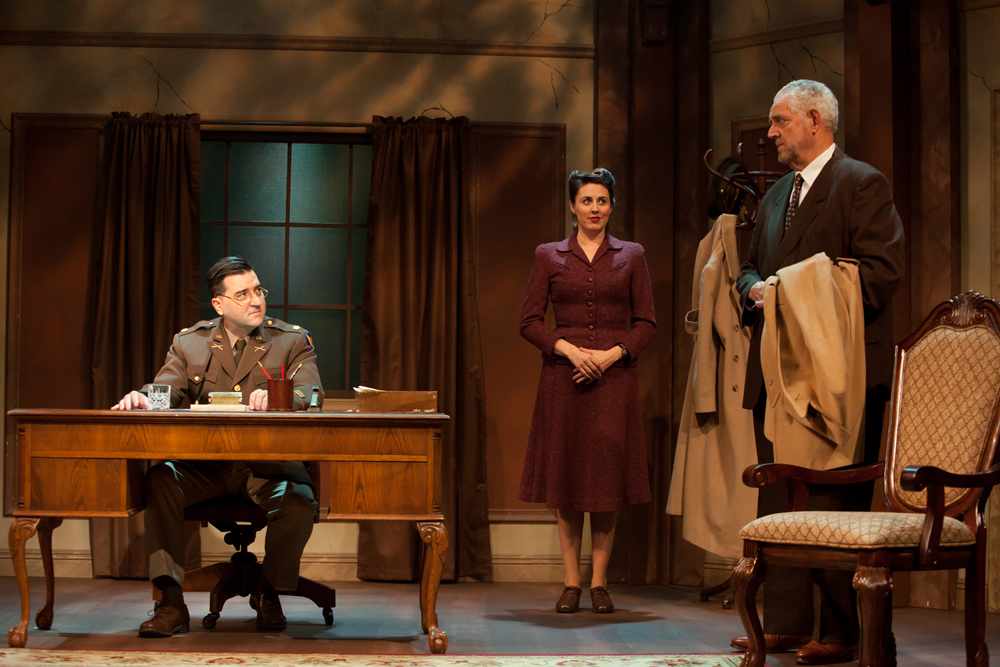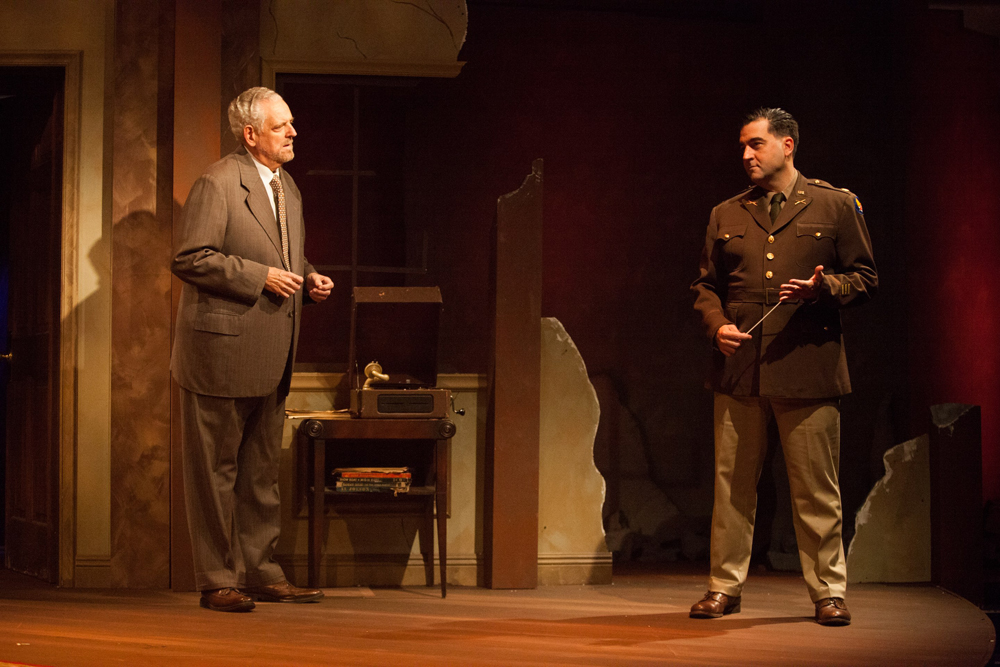6 minutes reading time
(1130 words)
Review: Taking Sides
 Review-
Review-
Rubicon Theatre in Ventura’s downtown cultural district is doing Sir Ronald Harwood’s Taking Sides through 12 November 2017. Harwood did The Pianist and has repeatedly shown interest in World War II-related moral dilemmas. Taking Sides fits right in. It’s basically a military tribunal “trial” by the American occupation command in Berlin of Wilhelm Furtwangler, the great German conductor who stayed in Nazi Germany throughout the Nazi era and World War II.
Patrick Vest as Major Arnold, Tara Donovan as Emmi Straube and Peter Van Norden as German composer Wilhelm Furtwängler in Taking Sides by Academy Award-Winner Sir Ronald Harwood and directed by Ovation Award-winner Stephanie Coltrin.
Photo Credit: Josh and Veronica Slavin
Photo Credit: Josh and Veronica Slavin
Review-
Rubicon Theatre in Ventura’s downtown cultural district is doing Sir Ronald Harwood’s Taking Sides through 12 November 2017. Harwood did The Pianist and has repeatedly shown interest in World War II-related moral dilemmas. Taking Sides fits right in. It’s basically a military tribunal “trial” by the American occupation command in Berlin of Wilhelm Furtwangler, the great German conductor who stayed in Nazi Germany throughout the Nazi era and World War II.
Harwood’s play sympathetically portrays both sides of the central issues around Furtwangler’s status and intentions [the Furtwangler and the American sides that is, there are other sides involved, such as the Nazi and Soviet, that appropriately receive no sympathy].
Harwood is also relatively clear about everyone’s shortcomings--the American commander’s stubborn, but familiar pride in his peculiarly American cultural ignorance played to perfection by Patrick Vest, Furtwangler’s obstinate sense of privilege and egotistical rationalization played by Peter Van Norden, the blind slavishness of those mesmerized by the Furtwangler legend, the hustle for survival of a devastated post-War Berlin populace too desperate to care about truth, everyone’s self-serving priorities.
We are taken through the particularities of Furtwangler’s predicament, point-by-point, as Major Steve Arnold initiates his new lieutenant, David Wills, into his interrogation techniques and the subtleties of prosecuting the case, and later, as Furtwangler is questioned directly. For the most part, the script tips slightly toward Furtwangler’s case, especially as we are shown the Major’s complete disregard for any intellectually-oriented discussion whatsoever.

Stage and screen veteran and returning Rubicon artist Peter Van Norden as German composer Wilhelm Furtwängler and Patrick Vest as interrogator
Major Arnold in Taking Sides by Academy Award-Winner Sir Ronald Harwood and directed by Ovation Award-winner Stephanie Coltrin.
Photo credit:Josh and Veronica Slavin
In the end, we are shown the actual film footage of the Berlin Philharmonic command performance for Hitler and his high command, with its two-story-high Nazi swastikas surrounding the full orchestra and mass chorus, and the powers-that-be in attendance and, at the very end--so stay in your seat to see--the actual encounter between Hitler and Furtwangler. Thus you are allowed to see for yourself with your very own eyes what happened during the moments so hotly contested over and over in the play.
Harwood’s script is able to exploit some peculiarities of the historical record. It is a record that shows that other musicians and intellectuals were rushed through “normalization” or “de-NAZIfication” while Furtwangler’s case evidently dragged on.
For example, Herbert von Karajan, a rival of Furtwangler’s referred to as “K”, is mentioned repeatedly in the play. He was “normalized” almost immediately while having the odd distinction of possessing not one, but two NAZI party member numbers, indicating he not only joined the NAZI party, but did so twice. In the play this is always presented as a point against K. In other sources outside the play this has been cited in K’s favor, since it could have indicated some double-dealing and obfuscation on K’s part that might not have been viewed as helpful to the Nazis. No one is sure, for example, that K wasn’t working for the Allies in secret. Having a double party number ID would enable him, for example, to be in two different places at the same time--in other words to be officially present in one place, while passing through a checkpoint elsewhere, especially as the Nazis were known to give musicians and musical performances special privileges and access; a decidedly unique tool that could have been exploited for anti-Nazi activities in an era of widespread double-and even triple-dealing and underground resistance.
As far as stagecraft, the production features a magnificent bomb-damaged Berlin drawing room set complete with rubble-strewn alley entrance. The acting is top-notch throughout with a fully realized, thundering performance, full of insouciance and the properly philistine pitch of Patrick Vest’s Major Arnold. Peter Van Norden plays his nemesis, Furtwangler with an appropriate Teutonic resolution and overbearing. Tamara Donovan plays a delightful Emmi Straube, successfully negotiating the designed ambiguities of the character’s allegiances. Clyan Brown gives us a homey, sympathetic Lt. Wills, while Vivien Latham delivers an appropriately unsettling Tamara Sachs, a cagey Berliner who has seen far too much of war and human suffering.
For the record, the play cannot, of course, include many of the facts of history, nor should it, as it wisely respects the requirements of pace and audiences. We do get hints but not the full details regarding Furtwangler as the man who, in the end, was not in Berlin, but had to flee to Switzerland in 1945, where he composed his most important work, the Symphony #2 in E minor; in 1934, that is, early on, he declared Hitler “an enemy of the human race” and is on record as saying that Hitler would not last long as Chancellor of Germany, let alone go on to declare himself Fuhrer, disband democratic Germany and form the Third Reich.
For the counter-case, much of what Major Arnold says in the play is backed by extremely gruesome evidence and sobering truth. Furtwangler’s mere presence and continued conducting of the systematically-and-ruthlessly-purged-of-all-Jews-and-non-Aryans-including-Slavs-and-Eastern-Europeans-under-his-directorship Berlin Philharmonic and ambitious concert schedule was exploited to significant Nazi advantage.
Furtwangler did help keep certain Germanic traditions alive, especially a certain interpretive tradition and a lively interest in the work of perennially underestimated Anton Bruckner [a favorite of this writer]. He was originally smitten by Beethoven and gave German-speaking composers a certain priority, something that works against him when detractors find it fits so easily with Hitler’s Aryan Suprematism.
But enough about music, go see the play and decide for yourself.
_______________
Taking Sides by Sir Ronald Harwood
Directed by Stephanie A. Coltrin
Starring Peter VAn Norden, Patrick Vest, Adrian Sparks, Clyan Brown, Tara Donovan, and Vivien Latham
Christopher Byries, set; Ginevra Lombardo, lights; T. Theresa Scarano, property design, Stephanie Coltrin Beyries, costumes, sound, Rod Mensies, dialect coach, Jessie Vacchiano, production stage management
Rubicon Theatre Theatre in Ventura’s Downtown Cultural District
1006 East Main Street, Ventura, California
For tickets call 805.667.2900 or online at rubicontheatre.org
Related Posts
Comments
No comments made yet. Be the first to submit a comment

